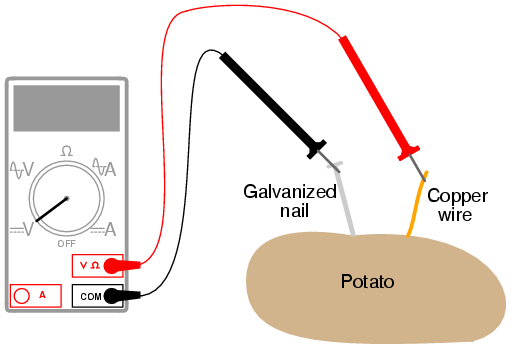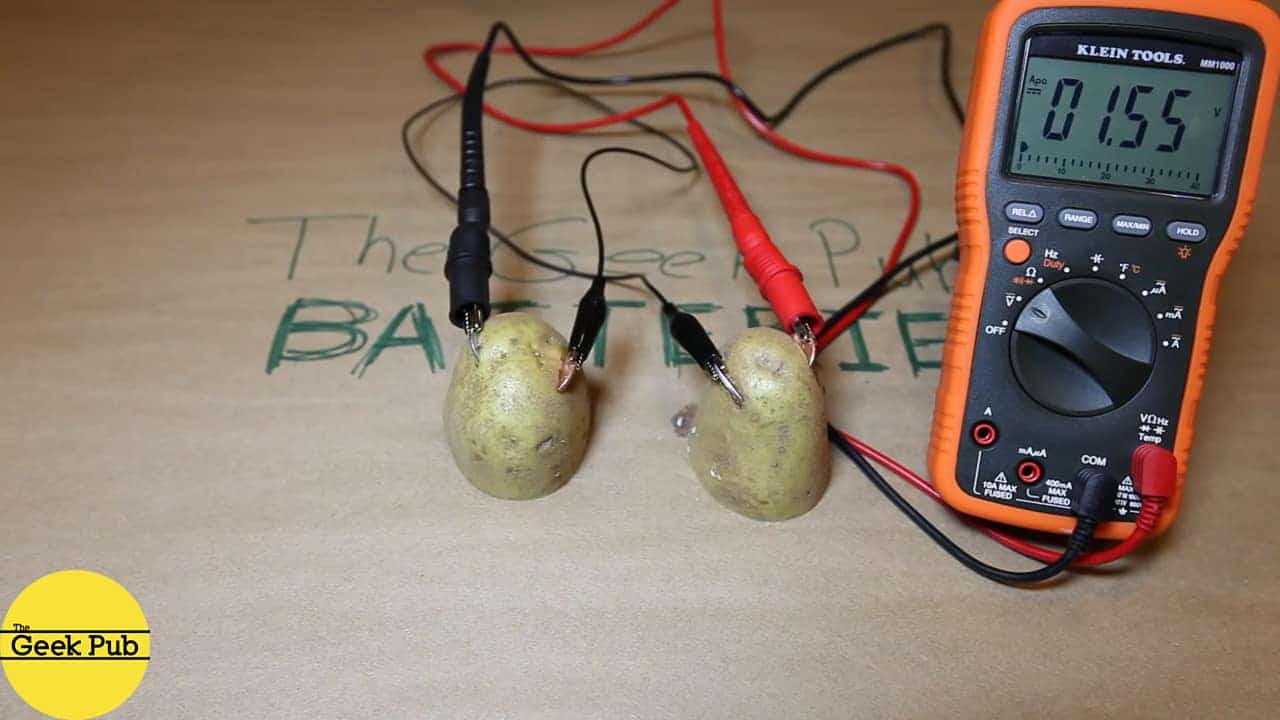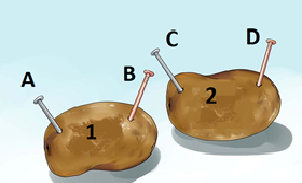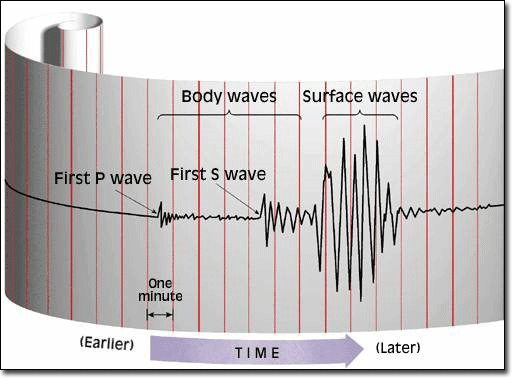Making a potato battery
Making A Potato Battery. One potato can produce around 0 5 volt of electrical energy. This chemical energy is converted to electric energy by a spontaneous electron transfer. 3 good quality copper wires approx. Two or more potatoes in case you want to generate more electrical energy.
 Build Potato Battery From bristolwatch.com
Build Potato Battery From bristolwatch.com
3 good quality copper wires approx. Two small pennies if available or alligator clips. It s the juices inside this starchy vegetable that make a potato battery. This chemical energy is converted to electric energy by a spontaneous electron transfer. To make a potato battery you will need two galvanized nails two copper coins two potatoes three alligator clip leads with clips on both ends and a small clock. One potato can produce around 0 5 volt of electrical energy.
1 wall clock or led clock that uses 1 button or pencil type battery.
You will need the following materials to make a potato battery. They can be found at a standard hardware or home improvement store. Potato battery youtube. Objective measure how the voltage and current of potato batteries change when you combine them in series or parallel. Two zinc coated or galvanized screws. To make a potato battery you will need two galvanized nails two copper coins two potatoes three alligator clip leads with clips on both ends and a small clock.
 Source: youtube.com
Source: youtube.com
How to make a potato battery. They are rich in phosphoric acid they contain all kinds of dissolved salts and sodium na potassium k and chloride cl ions abound. Objective measure how the voltage and current of potato batteries change when you combine them in series or parallel. But if we cut the potato in half each half will generate the 0 5 volts so we can use only one and a half of the potato to create the potato battery. Place the two potatoes side by side.
 Source: sciencebuddies.org
Source: sciencebuddies.org
Pierce the potato with a galvanized nail in the opposite side of the potato as the penny. The chemicals zinc and copper in the screw and penny wire react with each other which produces chemical energy. They are rich in phosphoric acid they contain all kinds of dissolved salts and sodium na potassium k and chloride cl ions abound. 3 good quality copper wires approx. Image will be uploaded soon.
 Source: bristolwatch.com
Source: bristolwatch.com
It s the juices inside this starchy vegetable that make a potato battery. In this science project you will learn about the basics of battery science and use potatoes to make a simple battery to power a small light and a buzzer. Two zinc coated or galvanized screws. One potato can produce around 0 5 volt of electrical energy. Two or more potatoes in case you want to generate more electrical energy.
 Source: thegeekpub.com
Source: thegeekpub.com
One potato can produce around 0 5 volt of electrical energy. 3 good quality copper wires approx. They are rich in phosphoric acid they contain all kinds of dissolved salts and sodium na potassium k and chloride cl ions abound. You will need the following materials to make a potato battery. Potato is not the best electrolyte among fruits and vegetables.
 Source: thoughtco.com
Source: thoughtco.com
Potato battery youtube. To make a potato battery you will need two galvanized nails two copper coins two potatoes three alligator clip leads with clips on both ends and a small clock. Materials required to build a potato battery. So collect them before proceeding further. Potato battery youtube.
 Source: youtube.com
Source: youtube.com
In this science project you will learn about the basics of battery science and use potatoes to make a simple battery to power a small light and a buzzer. They are rich in phosphoric acid they contain all kinds of dissolved salts and sodium na potassium k and chloride cl ions abound. Wrap the copper wire from one potato around the galvanized nail of the other potato. Image will be uploaded soon. A multimeter or voltmeter optional.
 Source: upsbatterycenter.com
Source: upsbatterycenter.com
Since the lemon and potato battery projects share the same steps general concepts and how it works explanation not all of that project info is repeated here. To prepare for the potato battery project simply gather the materials remove insulation off the wire and lightly sand the nail ends so they will interact well with the potato. Materials required to build a potato battery. Two or more potatoes in case you want to generate more electrical energy. They can be found at a standard hardware or home improvement store.
 Source: in.pinterest.com
Source: in.pinterest.com
That means we need around 3 potatoes to power up a led lamp of 1 5 volts. Two or more potatoes in case you want to generate more electrical energy. Objective measure how the voltage and current of potato batteries change when you combine them in series or parallel. One potato can produce around 0 5 volt of electrical energy. A multimeter or voltmeter optional.
 Source: sciencebuddies.org
Source: sciencebuddies.org
Image will be uploaded soon. Objective measure how the voltage and current of potato batteries change when you combine them in series or parallel. One potato can produce around 0 5 volt of electrical energy. 2 big potatoes washed thoroughly to remove all traces of dirt. But if we cut the potato in half each half will generate the 0 5 volts so we can use only one and a half of the potato to create the potato battery.
 Source: science.lovetoknow.com
Source: science.lovetoknow.com
This chemical energy is converted to electric energy by a spontaneous electron transfer. You will need the following materials to make a potato battery. Materials required to build a potato battery. That means we need around 3 potatoes to power up a led lamp of 1 5 volts. 3 good quality copper wires approx.
 Source: wikihow.com
Source: wikihow.com
Galvanized nails are regular nails that have a zinc coating that is necessary for this experiment. The chemicals zinc and copper in the screw and penny wire react with each other which produces chemical energy. A potato battery is a type of battery that is known as an electrochemical cell. They are rich in phosphoric acid they contain all kinds of dissolved salts and sodium na potassium k and chloride cl ions abound. To make a potato battery you will need two galvanized nails two copper coins two potatoes three alligator clip leads with clips on both ends and a small clock.
 Source: instructables.com
Source: instructables.com
A small 3mm led. That means we need around 3 potatoes to power up a led lamp of 1 5 volts. Wrap the copper wire from one potato around the galvanized nail of the other potato. Galvanized nails are regular nails that have a zinc coating that is necessary for this experiment. Do the same thing with another potato penny copper wire and galvanized nail.
 Source: wikihow.com
Source: wikihow.com
Objective measure how the voltage and current of potato batteries change when you combine them in series or parallel. Objective measure how the voltage and current of potato batteries change when you combine them in series or parallel. Place the two potatoes side by side. Two or more potatoes in case you want to generate more electrical energy. They can be found at a standard hardware or home improvement store.
 Source: wikihow.com
Source: wikihow.com
One potato can produce around 0 5 volt of electrical energy. 3 good quality copper wires approx. Since the lemon and potato battery projects share the same steps general concepts and how it works explanation not all of that project info is repeated here. A small 3mm led. The chemicals zinc and copper in the screw and penny wire react with each other which produces chemical energy.
 Source: kidzworld.com
Source: kidzworld.com
How to make a potato battery. 1 wall clock or led clock that uses 1 button or pencil type battery. So collect them before proceeding further. A multimeter or voltmeter optional. This chemical energy is converted to electric energy by a spontaneous electron transfer.
If you find this site adventageous, please support us by sharing this posts to your own social media accounts like Facebook, Instagram and so on or you can also save this blog page with the title making a potato battery by using Ctrl + D for devices a laptop with a Windows operating system or Command + D for laptops with an Apple operating system. If you use a smartphone, you can also use the drawer menu of the browser you are using. Whether it’s a Windows, Mac, iOS or Android operating system, you will still be able to bookmark this website.





